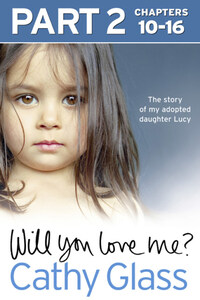‘It’s a nightmare,’ Jill, my support social worker, said over the phone. ‘The carer’s husband had to break down the bathroom door to get Lucy out, and she’s still refusing to speak to anyone.’
‘The poor child,’ I said. ‘You can’t blame Lucy for being so upset. Her life has been a misery, more or less from day one. No wonder she’s so angry and feels unwanted. No one has wanted her.’
‘I know. You’ve read the referral?’
‘Yes.’ Because Lucy had been coming to me as a planned move, I’d had a chance to read the referral so that I could better understand Lucy and cater for her needs. As well as briefly describing Lucy’s strengths and weaknesses, the referral gave a short history of her past. If a child came to me as an emergency foster placement I knew very little about the child, sometimes nothing. ‘Yes, I’ve read the referral,’ I said. ‘I nearly cried. Lucy deserved so much better. She’s been treated dreadfully.’
‘Absolutely,’ Jill said. ‘But the fact remains, she still has to move and at present she’s refusing to even visit you, or see her social worker. I’m sure she’d feel a bit better about the move if she could meet you, Adrian and Paula beforehand, see her bedroom and have a look around the house. But we can’t force her.’ And of course if Lucy was refusing even to meet me, how on earth were they going to move her?
Jill and I were both quiet for a moment and then I said: ‘I wonder if Lucy would talk to me on the phone? It would be better than nothing. Is it worth a try?’
‘Yes, it’s a possibility, I suppose. I’ll phone Lucy’s social worker and see what she thinks, and then I’ll get back to you. If you did phone it would have to be this evening – they’re still planning on moving her tomorrow, although I’m not sure how.’
‘I’m in all evening,’ I confirmed. ‘Speak later.’
We said goodbye and hung up. Jill had been my support social worker for the last six of the thirteen years I’d been fostering. We had a close working relationship and I respected her decisions and opinions. But as I walked away from the phone, visions of a screaming, struggling eleven-year-old girl being forcibly brought to my door flashed through my mind. I’d experienced younger children being taken from their parents and handed to me in a very distressed state. I’d sat and cuddled them for as long as it took to calm them and until their sobbing eased. Rarely does a child willingly leave their parents – usually only in the worst cases of sexual abuse. But Lucy wasn’t little and couldn’t just be left in my arms. And also, she wasn’t coming to me from her parents, but from a temporary foster placement. I thought it was an indication of all she’d been through that she’d become hysterical at having to move from a family she’d only been with for three months.
It was now 5.00 p.m., and a cold winter evening in February. My two children – Adrian, aged thirteen, and Paula, nine – were watching television while I was making the evening meal. Having grown up with fostering, they’d seen many children come and go, of all ages, of both sexes and from different ethnic backgrounds. They took any new addition to our family in their stride, and when I’d told them a couple of days ago that Lucy would be coming to stay for a while, Paula had predictably said, ‘Oh good, a big girl to play with,’ while Adrian, preferring a boy his own age for company, had pulled a face and sighed: ‘Not another girl in the house!’ Although, in truth, we all welcomed as family any child who came into our home.
Jill, efficient as usual, phoned back fifteen minutes later. ‘The social worker was busy so I telephoned Pat, the foster carer,’ she said. ‘Lucy’s still refusing to talk to her and she’s certain she won’t talk to you either, but Pat said she’s happy for you to try. Also, and more worryingly, Lucy is refusing to eat – she hasn’t eaten since all this blew up the day before yesterday. I’ll give you Pat’s number. I told her you’d phone at about seven o’clock. Is that all right?’
‘Yes,’ I said, now even more worried for Lucy. Picking up the pen I kept with the notepad by the phone, I wrote down the carer’s telephone number and then read it back to check I had it right.
‘Good luck,’ Jill said. ‘Pat and her husband were going to move Lucy tomorrow – Saturday – but if she’s still not cooperating then they’ll have to wait until Monday, when the social worker is back in the office and can sort it out.’














